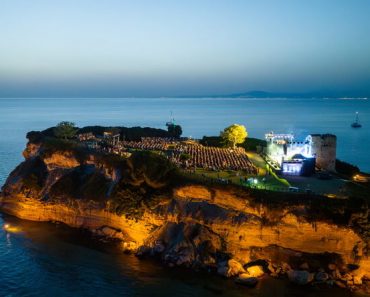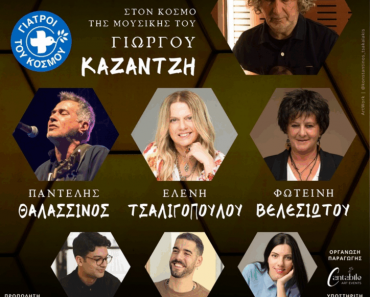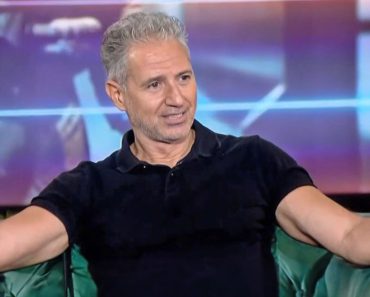On May 21, 2005, Arsenal defeated Manchester United to win the FA Cup in a legendary match that, for the first time in the competition’s history, was decided on penalties. In New Jersey, USA, a 139-meter-high roller coaster of pharaonic proportions — the tallest in the world at that time — was inaugurated. Meanwhile, in pre-war Kyiv, Yulia Tymoshenko, a close ally of pro-European President Viktor Yushchenko, was completing her fourth month as Ukraine’s first female prime minister.
Elena Paparizou at the moment of receiving the trophy from 2004 Ukrainian winner Ruslana.
In reality, no one in Greece has much reason — or intention — to remember the above events. For Greeks, May 21, 2005, remains, and likely always will remain, synonymous with the emphatic victory of Elena Paparizou in the 50th Eurovision Song Contest. On her name day, the then 24-year-old singer achieved what had seemed unattainable for decades. Her win both relieved and reignited the national frenzy around Eurovision — a once-decadent and somewhat discredited institution within domestic television that had long occupied a marginal place in the public’s consciousness.
The National Helena
“Twenty years later, and everything comes back to my heart. It was never about me — it was about our Greece. For a country that loves music, that fights, that gets emotional, that knows how to get up,” says Elena Paparizou today.
The singer who not only attained legendary status in Greece but also emerged as a totemic figure of Eurovision. “My Number One” was voted the fifth most popular song in the history of the contest just months after her Kyiv victory. Her invitations to the 2021 (Rotterdam) and 2024 (Liverpool) Eurovision events confirm her enduring popularity.
“In 2005, Greece took to the Eurovision stage and showed all of Europe what soul means. I simply had the honor of being the face of that moment. From then until today, not a moment has passed that I haven’t felt gratitude. For the support, for the love, for the flag that Greeks held in every corner of the world,” said Paparizou.
It is worth noting that that ground-breaking triumph was the result of immense time and effort — far more than the six minutes (three in the semi-final and three in the final) she spent on stage performing.
The Networking Factor
Despite initial hesitations about returning to the Eurovision stage, four years after her participation with Nikos Panagiotidis (as part of Antique) and their song “Die for You,” Paparizou accepted ERT’s direct invitation in 2005. She then embarked on an extensive promotional tour across European capitals with that year’s Eurovision commentator, journalist Alexandra Paschalidou. “Until then, Greece had not been seriously involved in Eurovision,” Paschalidou explains.
“A groundbreaking show entitled Euromania was created especially for that year, broadcast every Friday night by ERT. For the show, we traveled with Elena to many cities across Europe.” It wasn’t just methodical networking; it was sustained lobbying that helped promote and elevate “My Number One.”
Elena Paparizou with journalist and 2005 Eurovision presenter Alexandra Paschalidou.
For Paschalidou, the 2005 season was personally significant, as she presented both Sweden’s Melodifestivalen final — widely considered the gold standard of Eurovision national finals — and Greece’s. In the Greek national final, the audience had three songs to choose from.
Paparizou performed “OK,” “Let’s Get Wild,” and “My Number One.” The latter won decisively, with 66.47% of the combined televoting and jury vote — results announced by Mimis Plessas. Notably, “The Light in Our Soul,” another strong contender, was disqualified after leaking before the final.
Blue and White Dream Team
From early March, once Greece had both a song and a singer, Paparizou and Paschalidou — old acquaintances from Sweden — spent over eight weeks touring Europe, culminating in Kyiv. “I remember running from meeting to meeting to talk to foreign commentators, to persuade them, to build a story around the song. I dedicated a lot of time to that part,” Paschalidou recalls.
“What I can say 20 years later is that we had the right people in the right places. It was a real dream team.” She adds that she’ll never forget the moment she left her broadcasting booth to join the stage. “Although I’m a fighter and don’t cry easily, I started crying. I lost it — it was a shock. Shortly after, they took me to the stage. It was shocking, shocking. A magical moment.”
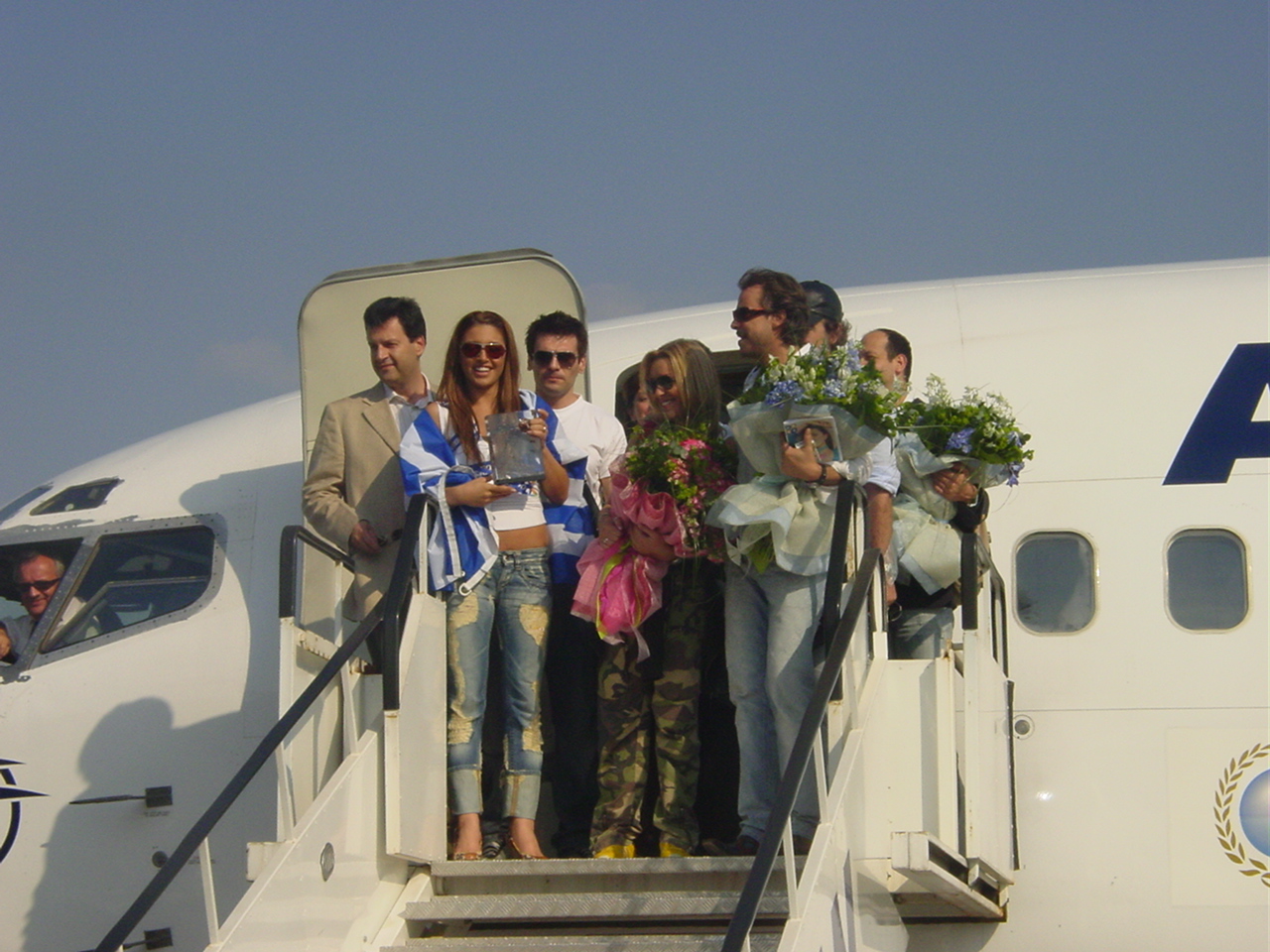
The airport reception of the song’s contributors in May 2005.
I Was Also in the Green Room
Natalia Germanou, lyricist of “My Number One,” witnessed everything from the Green Room. She describes that night with powerful emotion.
She recalls how tense things were when the early results trickled in with mediocre scores. “I remember that in the first results, when we didn’t get great scores, we started biting our nails. We were all nervous. And a little later, when the rain of tens and twelves started, we didn’t have time to sit on the couches. Everyone was standing.”
She credits Christos Dantes, who kept the team grounded. “Dantes was the one who imposed calm in a way. Especially on me and Fokas Evangelinos, who were excited and told him as the night progressed that we had won.”
The turning point came when Alex Panayi, backing vocalist and Eurovision veteran, did the math and confirmed that the remaining votes couldn’t overturn Greece’s lead. “About three minutes before the announcement, a technician came to our mission area, grabbed Elena, put a microphone on her, and told her ‘It’s done.’”
Vigil in Kyiv
No one on the “My Number One” team slept that night, as Natalia Germanou recalls.
The delegation returned to the hotel only hours after the final and celebrated in the lobby. Dantes played the piano while Paparizou sang until morning. Germanou says these moments are etched in her heart — cherished and irreplaceable. As for whether there’s a winning formula for Eurovision? “No, there is no algorithm or recipe. Because every year, the organization changes. People, music, trends, the audience — everything changes. It’s a golden moment when it happens,” she concludes.
From Helena to Klavdia
That golden moment in 2005 was the result not just of Paparizou and her team but also of choreographer Fokas Evangelinos. He created a performance so iconic that it’s impossible to imagine the song presented any other way.
Now, two decades later, Evangelinos says he feels just as emotional about Greece’s 2025 representative, Klavdia. “I will never forget the team’s dynamic and the public’s support. Nor will I forget those low early scores — until Greece prevailed. But I must say, 20 years later, Klavdia with Asteromata moves me just as much.”
From Triumph to Strife
As is often the case, triumphs can be followed by disputes. After the win, composer Manos Psaltakis claimed legal authorship of the song. A court later granted him the right to be listed among its creators.
The triumphant airport reception for the Eurovision-winning team, May 2005.
In speaking with To Vima for this anniversary feature, Psaltakis shared his inspiration for the melody — conceived on a beach in Vouliagmeni two years before submission. He credited Christos Dantes for delivering the song to ERT and acknowledged his key role.
On the night of the final, Psaltakis says he was caught between joy and sadness. He also expressed hope that his Eurovision distinction might help him secure an honorary pension from the Ministry of Culture.
Christos Dantes, reached for comment, declined to elaborate on the Kyiv experience. “It was a great success, but one that ultimately displeased me and left me with a rather bitter taste,” he said, citing the post-victory speculation and unfounded opinions.
“Success truly belongs to Elena Paparizou,” he added, generously acknowledging the old adage that success has many fathers, while failure is an orphan.
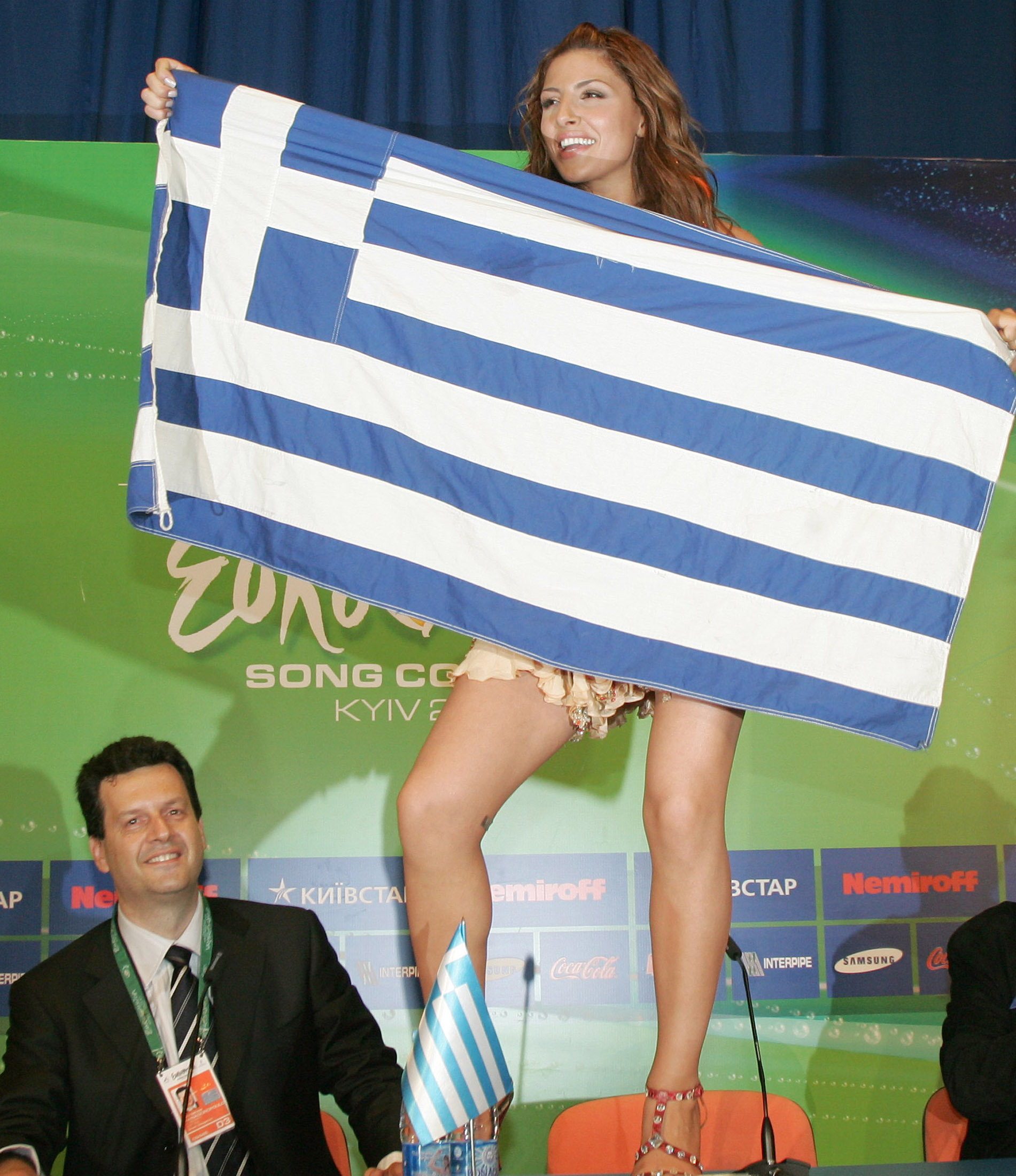
Greece’s Elena Paparizou holds her national flag as she poses during a news conference in the Ukrainian capital Kiev early May 22, 2005. Greece won the 50th Eurovision song contest with Paparizou’s fast-moving “My Number One” beating 23 other competitors. REUTERS/Vasily Fedosenko
Twenty years after the triumph in Kyiv, the best answer to questions of “ownership” comes from the woman at the heart of it all. “The victory at Eurovision belongs to all of you. It belongs to Greece that dreams and never stops singing.
“I am proud to have become a small part of this great, shared memory. And if I could go back in time, I would live it all over again, just to see your eyes shine,” concludes Elena Paparizou — the singer who gave Greece not just 230 points and a victory, but an enduring, collective memory that time will not erase.


